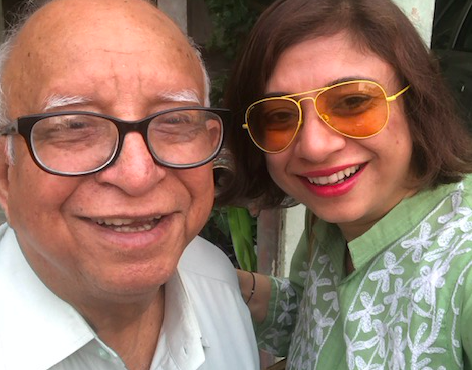
In October 2019, when I was visiting India, I had an interesting conversation with my father.
My dad, who is in his 70s, is still active, bright, and involved in his work. He travels extensively and is inspiring in many ways. But when I said to him that he needs to put his phone away every now and then, quiet his mind, and connect with his inner voice, he said to me, “That is the one thing I don’t think is possible. What if someone needs something urgent? And anyway, I don’t think anyone can make their mind quiet.”
I jokingly said, “Papa, you don’t run an emergency service. It’s okay to disconnect. And, meditation can help you create the quiet space in your mind.” The thought that haunted me that day: How can a country give the gift of yoga and Ayurveda to the world, but its own citizens not embrace its benefits?
The concept of stillness and calm doesn’t elude just my father. In India—where I spent a big part of my life growing up—I rarely saw anyone alone or quiet. Whether at a gym, corner store, salon, or restaurant, from walking paths to private homes people are always surrounded by people. And I have rarely witnessed silence between words. Even today, at homes, in airports, in airplanes, or trains…if people aren’t arguing or excessively talking about Bollywood, politics, cricket, familial gossip, or TV shows, they are watching WhatsApp videos loudly.
I have seen both my mother and mother-in-law perform their morning puja while simultaneously dish out advice to the domestic help. But isn’t the time of prayer also the time for stillness and meditation? Silence and solitude are frightening to many where I come from.
I have a few close friends and cousins in India who don’t thrive on socializing with two dozen folks every weekend or attending a birthday bash at a club every weeknight or showing up to every family get together. They, and people like them, who like to dwell in their realm of intentional isolation, have been labeled as “antisocial.” They are frowned upon and thought of as lacking social etiquettes. There are serious negative connotations attached to these people’s desire of wanting to disconnect with society on occasion. “Loner” is the term hurled at them. Like something is inherently wrong with wanting some stillness and quietude.
Honestly, most people aren’t allowed the luxury of picking up solitude over social commitments within the culture. You are expected to attend your colleague’s grandma’s 90th birthday party with the same enthusiasm you’d attend your cousin’s baby’s thread ceremony—be it a weeknight or a weekend. I remember wedding seasons were exhausting because they meant getting dressed (sometimes on a weeknight), buying gifts, and showing up to events for people you didn’t particularly care about. I couldn’t wrap my brains around these commitments, but I still brought that thinking with me to the United States when I moved here.
In my early life here in the U.S., I emulated the lifestyle I grew up with in India, because people learn from their surroundings and adapt from how they are bought up. This meant people were in and out of our homes constantly in New York City. I was cooking and entertaining even on weeknights. Our home was party central. You’d never see me quiet. You’d never see me alone. You’d never find me sitting. And I took pride in my moniker, “social butterfly.”
I was probably exhausted from managing a full-time job, graduate school, and a hectic social calendar along with home and family—it showed through my occasional meltdowns. My husband was definitely unhappy about not having any personal space or having his football Sundays overrun with Sunday brunches and happy hours and other innumerable social plans over the weekend. I have to admit, after hectic weekdays at work, my over-scheduled calendar made little room for any personal growth or creative writing in my life, which frustrated me.
But I didn’t know better. I didn’t have the courage to say “no” and definitely wanted to fit in. I lived in a world peppered with stereotypes: the number of party invites, the different circles of friends you hung out with, the innovative dishes you brought to the potluck defined the barometer of success for socially adept individuals. While my American friends’ eyes brightened up when they talked about pajamas and Thai take out on a Friday evening, as an Indian, if you didn’t have plans on a Friday evening or if you weren’t trying out new restaurants with friends on a Saturday night, you were deemed a loser.
If your idea of a nice birthday celebration was enjoying a quiet dinner with a few loved ones instead of throwing a wild bash, you were considered unpopular. These were harsh rules the majority of Indian kids were often brought up with, and I was one of them. These values weren’t part of dinner conversations. But they were narrated through action on a daily basis. Remember: in our 20s, most of us cared about external validation and tried to fit into spaces that weren’t for us.
But as I got older and yoga became a big part of my life even off the mat, I found contradictions and discrepancies between who I was expected to be and who I truly was at my core. The real me started to emerge from underneath the rubble. I started to notice that being constantly busy felt inauthentic and empty. I felt the need to refill myself if I had spent my entire day around people. I felt an increasing distance between myself and true happiness. And I am one of those people (truly blessed) who is happy and positive most of the time.
I accepted that I wasn’t conscious of the quality of people I surrounded myself with. Don’t get me wrong; all my “friends” were graduates from incredible schools, in amazing jobs, and in stable relationships. On paper, they met the criteria any and every parent would have approved. But did we have other things in common aside from our socially approved accolades? Were we even evolving at a similar pace? Some people made me defensive—the ones who didn’t understand why writing, activism, coaching, and healing were my chosen career paths when I have held jobs with Kelloggs, in the retail industry, and a bank.
It took me a long time to accept that not every relationship nourished me.
Because I had never paused and reflected about my own needs, I never asked myself the bigger questions like: if hanging out with certain people angered me or made me feel bad about my life choices, what was the point? Did we want the same things from life or were we too afraid to even ask these questions because unfamiliarity would mean parting ways?
Was this the life I wanted or was this the only life I had always known, so I was afraid to walk away from it? But how could I find the answers to my quandary if I didn’t make time for myself in my own life?
Pause and assess. Pause and reflect. Pause and build boundaries—sometimes around my own self. Pause and breathe. Pause and reassess.
The Bhagavad Gita teaches us that, “Yoga is the journey of the self, through the self, to the self.” I finally understood that while the extrovert in me loves people and enjoys seeing friends and family on a regular basis, the introvert in me is particular about the quality of people I hang out with.
I don’t need people to validate my existence or choices. While I thrive on the energy of the people around me, I also love my own company. I get overwhelmed if I have no time to pause and process conversations and interactions. Much as I appreciate social dining, I also like buying a cup of soup and eating it by myself, occasionally. I thrive on intimate groups and deeper, personal connections rather than shallow engagements. I’d much rather be truly present for the people I care about than just show up for 50 people without attachment.
Life is too precious to squander away over meaningless interactions.
Yoga has reiterated that alone time to recharge is nonnegotiable for me. Writing and teaching yoga and Ayurveda workshops are part of my self-care regime. I need quietude to dive deep into my creative spaces and solitude to connect with my true self. To remain a perpetual learner and student of life, I need a daily dosage of stillness. Yoga has helped me embrace my true self without apologies or anger.
My older niece told me recently that she liked how I lived: happy to order in takeout and watch Netflix with the family on a Saturday night with as much enthusiasm as ready to go to a party or attend a literary event or a read a book alone. These events don’t define me as a person. For me, that’s the most heartfelt compliment I have ever received as an extroverted-introvert in my journey of finding myself through stillness and solitude.
“Blessed are those who do not fear solitude, who are not afraid of their own company, who are not always desperately looking for something to do, something to amuse themselves with, something to judge.” ~ Paulo Coelho
~










Read 1 comment and reply